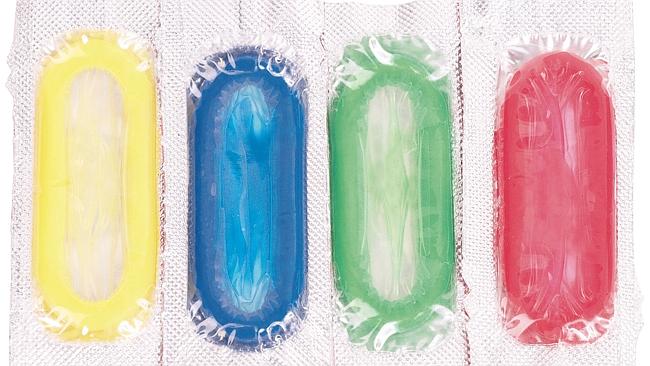
Condoms could soon be sold in school vending machines in a bid to stop the spread of chlamydia. Source: Supplied
IT is the “silent epidemic” threatening to leave a generation of young women infertile.
Increased sexual activity combined with falling condom usage has led to a 120 per cent increase in cases of chlamydia.
An estimated 356,000 Australians acquired the sexually transmitted disease in 2013 — more than four times the number of reported diagnoses — a new UNSW Kirby Institute report shows.
Experts are calling for more testing as well as cut-price condoms to be available in female pub toilets, corner stores and even schools to safeguard against what’s being dubbed a “silent epidemic”.
“Chlamydia could be a ticking time bomb for women’s infertility,” Kirby Institute sexual health program head Professor Basil Donovan said.
“Peak hour for chlamydia in young women is age 15 to 17, and the average Australian woman doesn’t try to get pregnant until she is about 30.
“So there is this thirteen-year gap between infection and having to deal with the consequence that is she is infertile.”
Doctors call chlamydia a “silent epidemic” because the infection often shows no symptoms.
It can take as little as a decade to destroy a woman’s reproductive capacity if left untreated. Untreated chlamydia in males can damage their sperm’s DNA.
Prof Donovan said dating apps such as Tinder are only adding to the problem because they attract “core transmitters”.
“Those sorts of apps are popular with people who like to have a lot of sex,” he said.
“When you have a minority of people, called core transmitters, who have a lot of partners, they are the people thought to be the drivers of STI epidemics.”
Prof Donovan said the five-year study is pivotal because it shows increased STI testing is not the only driver of the rise in recorded infections.
La Trobe University Emeritus Professor Marian Pitts runs the country’s biggest sex survey every five years on behalf of the Federal Government.
She said young people are sleeping with more partners and are less likely to use a condom than what they used to be.
“Young people are taking precautions against pregnancy but are less concerned about taking precautions around STIs like chlamydia,” she said.
“Our research has shown that when a condom is available it is used.
“I would advocate increasing visibility and accessibility to condoms so you can get them when you need them.”
She said this advocacy would involve more vending machines in convenience stores, female pub toilets and even schools.
“We should think about what message having condoms available at schools would send, and I think the message it would send is that ‘we approve of safe sex’,” she said.
“But of course the naysayers would think it ‘says we approve of sex’ — which, actually, once you are over the age of consent, what are we disapproving of?”
Originally published as Calls for condoms to be on sale in schools
